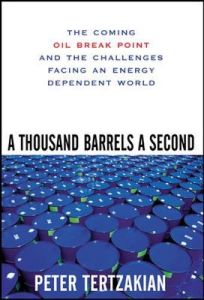Join getAbstract to access the summary!

Join getAbstract to access the summary!
Peter Tertzakian
A Thousand Barrels a Second
The Coming Oil Break Point and the Challenges Facing an Energy Dependent World
McGraw-Hill, 2006
What's inside?
Historically, energy shortages lead to breakthrough replacements. Here comes the shortage: where's our breakthrough?
Recommendation
So many books lately have touted the looming energy crisis that a new book on the topic bears a fairly heavy burden. It must demonstrate a firm grasp of prior scholarship, yet be innovative enough to serve a distinct purpose amid similar tomes. In this regard, author Peter Tertzakian achieves the first objective nicely and comes close on the second. He shares his keen sense of how the impact of energy sources has rippled across history and altered its course. He discusses the concepts of "energy cycles" and "energy break points" to explain how inherent mismatches between dwindling supply and growing demand lead to crises that can be resolved only by innovation and "rebalancing solutions." Upon closer examination, though, the "break point" seems referential to the familiar notion of a "paradigm shift." And, alas, the author's menu of alternate energy choices is no more satisfactory than anyone else's. Given his historical acumen, however, getAbstract finds that this book is a useful addition to the expert chorus warning the global citizenry to wake up and smell the petroleum.
Summary
About the Author
Peter Tertzakian's company publishes weekly charts that evaluate worldwide energy trends. He is also the head energy economist at a leading equity firm that specializes in energy.

















Comment on this summary